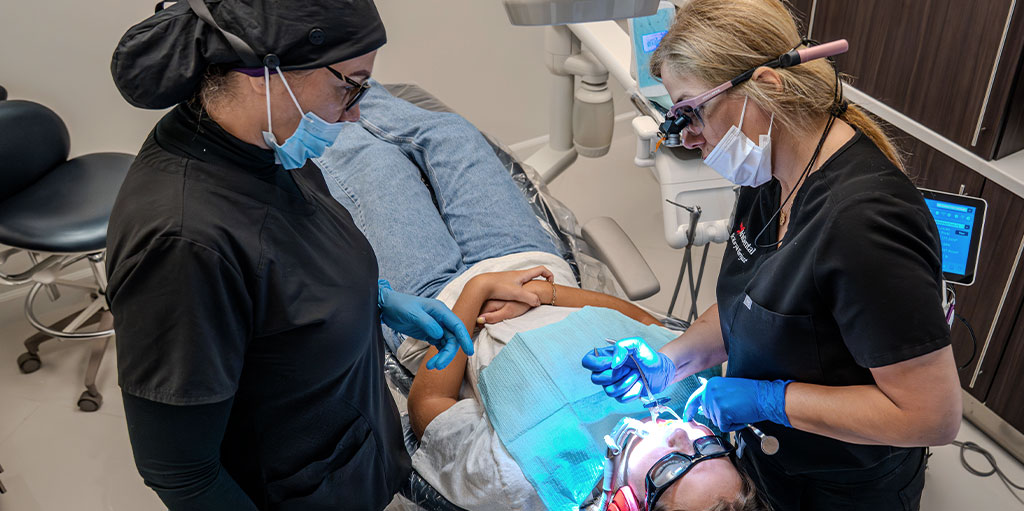There are several types of dental implants and they are often categorized either based on their placement method, which are endosteal, zygomatic, subperiosteal and transosteal, or their material (zirconia and titanium). Dental implants are a permanent and secure method of regaining lost teeth. It will cause you to chew more conveniently and bring back your beauty and self-confidence. But dental implants are more diverse than you can ever think of. The finest implant will be selected on the basis largely of the health of your teeth and jaw.
But cost and your own personal preferences also enter into the final choice. So if you’re going to take dental implants for a spin, read with us through to the end of this article to learn about the types of implants, the advantages and disadvantages of each, and the characteristics they have.
What Is a Dental Implant?

As mentioned earlier, dental implants are dental prostheses placed on, through, or into the jawbone by a dental surgeon, in order to replace one or more missing teeth. The most common type of dental implants, which we will get to shortly, comes with an abutment and a custom-made crown. The abutment connects the crown to the implant, and is often made out of titanium or zirconia (ceramic). The crown itself is made to fit the patient’s mouth and match the color of their natural teeth. Dental crowns are typically made from porcelain, metal, or resin. But there are other dental implant types out there that you might want to know more about.
Types of Dental Implants Based on Placement
Dental implants are divided into several categories based on their location and position in relation to the jawbone. Each type of implant consists of three parts: a crown, an abutment (connector), and a fixture, which are available in different sizes and designs. The implant specialist selects the most suitable option from these types by examining the condition of the patient’s mouth and teeth. Types of dental implants based on their location in relation to the jawbone include Endosteal, Subperiosteal, Transosteal, and Zygomatic implants, each of which we will discuss below.
Endosteal
An endosteal implant is the most common type of implant placed in the upper or lower jaw during a multi-stage procedure. During this procedure, a cylindrical or screw-shaped base (threaded post) is placed inside the jawbone and becomes integral to it, acting as the root of the artificial tooth. After the base has been placed in the bone, 3 to 6 months of osseointegration and healing of the base within the jaw are required.
Then a temporary abutment and crown are placed. The abutment is a connector between the implant base and the crown, which is placed on the implant under local anesthesia. Finally, the final crown is shaped and placed on the abutment, the same shape and size as the other teeth, and the oral condition of the patient.
Subperiosteal
Though endosteal implants are standard and popular, they cannot be placed in people who have lost a considerable amount of jawbone. In such cases, the implant is placed on the jawbone instead of inside. Such an implant is called a Subperiosteal implant. Mini dental implants are generally used to anchor the implant to the jawbone in a Subperiosteal implant. Compared to an Endosteal implant, a Subperiosteal implant is a more complex surgery, more costly, and has a greater possibility of having complications because it is placed under the gum.
Transosteal
If there is not enough jawbone to support other types of implants (endosteal and subperiosteal), then a specialized and highly complex type of implant called a transosteal implant is used. This type of implant, which is rarely performed in the lower jaw, involves placing a metal plate under the lower jawbone and then screwing posts through the jawbone to secure it into position. The complex surgery and specialized design make the procedure rarely used.
Zygomatic
Zygomatic implants are another implant for people who don’t have enough upper jaw bone for regular implants or for whom regular implants didn’t work. These implants are longer and are placed in the cheekbone (zygomatic), a thicker bone, rather than the upper jaw. These implants offer a stable anchor for dentures.
Hence, we have partially answered the question of “what are the different types of dental implants” by classifying them based on their placement. There are specific uses for each type based on the situation. Endosteal implants are more generic and common, but your doctor may recommend a different type based on your conditions.
What Are The Most Common Endosteal Dental Implant Types?
Since Endosteal dental implants are the most common among different dental implant types, this section talks about the materials used in these dental implants. As mentioned earlier, the materials of choice for abutments are titanium and zirconia, both of which are FDA-approved. Below you can read the pros and cons for each of them:
Titanium

Titanium and its alloys are the most widely used materials for implant abutments. Because the abutment is inserted into the jawbone and is expected to eventually fuse with the bone, titanium is often coated with a synthetic bone substitute that mainly consists of natural bone. This synthetic material is called hydroxyapatite (HA). HA forms a biochemical bond with the bone and becomes part of the jawbone over time. That said, titanium has its own pros and cons, some of which are listed below:
Pros:
Extreme durability
Titanium has the highest strength to weight ratio out of all metals, making it a great choice for abutments that are inserted into the jawbone, as it can last for years.
Ability to attach to bone (Osseointegration)
Once healed, titanium implants last a long time; they can even stay in your jawbone permanently if you practice good oral hygiene, take proper care of your implant(s), and schedule regular checkups with your dentist or oral surgeon.
Affordability
Titanium implants cost less to manufacture; therefore, they are less expensive than their zirconia counterparts, which is a big plus for a lot of patients.
Bio-compatibility
As titanium has a low electrical conductivity, once inserted into the bone a thin oxide layer is formed on the implant, making it very resistant to corrosion.
Cons:
Risk of allergic reactions
Though quite rare, some people do develop an allergy to their titanium implant. Therefore, if you have a history of allergies to metal, consult with your doctor. They might want to run an allergy test prior to the implant procedure.
Titanium toxicity
This one is also rare, but once it occurs, it can cause bone inflammation and bone loss, leading to dental implant failure. Symptoms include fatigue, headaches, blurred vision, pain and swelling. Contact your oral surgeon if you develop any of these symptoms.
Implant failure
Titanium implants might fail to bond with the jawbone if the candidate has such underlying health conditions as diabetes, cancer, alcoholism, or excessive smoking. Of course, implant failure can happen with any type of dental implants and is not just limited to titanium ones.
Zirconia

Though relatively new, zirconia implants have become quite popular due to the advantages they offer over titanium implants. They do cost more, so you need to consult your oral surgeon and make an informed decision before opting for these dental prostheses. Check out this article on our website if you want to learn more about zirconia dental implants and why they have created a buzz in the field of dentistry. Zirconia implants too have their own pros and cons, some of which being:
Pros:
Natural looking
Due to their white color, zirconia implants will look just like your natural teeth.
Allergy free
Because they are metal-free, zirconia implants cause no allergic reactions; therefore, they are perfect for people with metal allergies.
Osseointegration
Zirconia implants integrate better with the jawbone, allowing it to firmly fuse with the implant.
Bio-compatibility
Zirconia dental implants are even more bio-compatible than their titanium counterparts, making them a more favorable option when it comes to choosing one of the two dental implant types.
Plaque collection
Compared to titanium implants, zirconia implants have a lower risk of plaque formation around the implant, making them a healthier choice.
Cons:
Degradation
Their strength can degrade as the implants age.
Placement issues
If not carefully placed in the ideal location, zirconia implants could potentially cause complications.
Single Implants And Multiple Implants
You may have a dental implant for just one missing tooth. In this case, the doctor will use a fixture, an abutment, and a crown to replace your tooth. However, if you have lost more than one tooth, a multiple-tooth implant is used for you. Replacing two teeth side by side with one implant abutment is feasible and reduces the cost of treatment; however, it is better to use a separate implant for each missing tooth. Usually, dentists do not recommend using one implant abutment for two teeth or consider it acceptable for front teeth that are less stressed.
Apart from the issue of reducing cost, sometimes it may not be possible to install separate implants for two teeth side by side due to the condition of the jawbone, in which case one implant is used for two teeth.
Multiple-tooth implants side by side are also possible; in this case, at least two implant abutments should be used in the empty space of the missing teeth, and the crowns of the teeth that are made and connected should be installed on these two abutments.
Even if all the teeth in one or both jaws are missing, a full mouth dental implant is still an option. This procedure creates a permanent replacement for your teeth. However, the decision about whether a whole mouth implant is right for you should be made in consultation with your dentist.
Same Day Dental Implants
Same day dental implant is one of the latest types of dental implants. It means placing an implant and placing a temporary crown on it in one session. In other words, after a tooth is extracted, the patient receives the implant on the same day, and a temporary crown is placed on it so that there are no problems in terms of aesthetics and function.
People who, for some reason, do not want to have many visits to the dentist or are worried about multiple surgeries can use same day dental implants. This method has a short treatment time but is not suitable for everyone.
Patients with insufficient bone density or volume in the jaw are not suitable for same day dental implants. Also, those who have active periodontal disease or smoke may not be able to use this method. Ultimately, the decision on whether or not an immediate implant is appropriate should be made by a specialized dentist, taking into account the specific circumstances of each patient.
All On 4 Dental Implants
All-on-4 is a dental implant treatment in which the set of upper or lower teeth is replaced with the help of only four implants. The four implants are inserted at an angle and act as a support system for the fixation of a new set of permanent teeth.
Compared to other implant procedures, All On 4 does not require the same bone density for the fixation of the implants. For this reason, this treatment is perfect for patients who do not have enough jawbone to support a larger number of implants. All On Four dental implants can be completed in some cases in a day, so it is a good option for patients who want to have their smile restored in a limited time.
Mini Dental Implants
Mini implants are smaller in size compared to regular implants. They are single-piece and thinner implants that are used to secure dentures in small spaces or for patients who have lost jawbone. Mini implants reduce or completely eliminate bone grafting because they are thinner in diameter and require less bone mass to be embedded in the bone.
Which one of these dental implant types do holistic dentists recommend?
Although titanium dental implants are durable and have long been tried and tested, holistic dentists recommend zirconia dental implants, mainly due to their being bio-compatible, metal-free, and non-corrosive. Located in Orange County, California, Aria Dental offers a variety of holistic dental services, including zirconia dental implants. Call us today if you want to schedule an appointment and learn more about these two dental implant types. We will happily help you make an informed decision!















